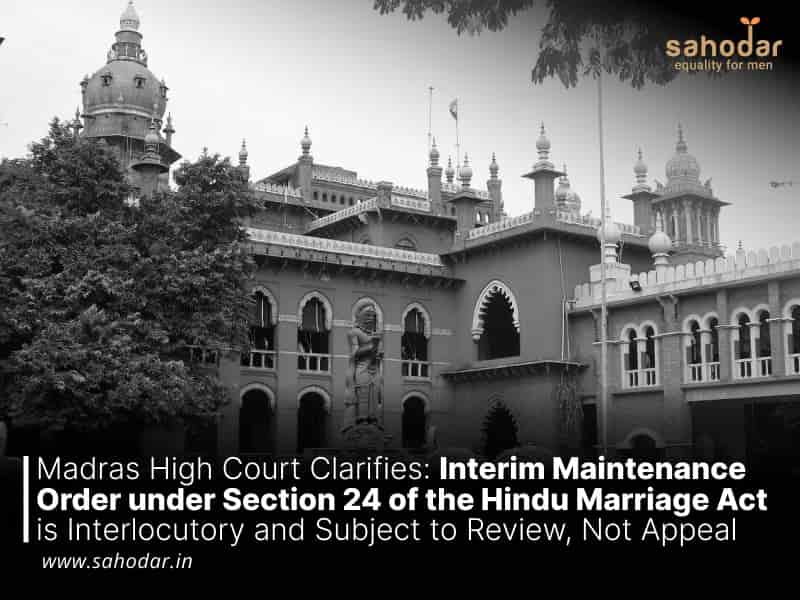The Madras High Court recently clarified that interim maintenance orders issued under Section 24 of the Hindu Marriage Act are considered interlocutory and cannot be appealed under either Section 28 of the Hindu Marriage Act or Section 19 of the Family Courts Act.
However, Justice M Sundar and Justice Govindarajan Thilakavadi specified that a revision against the interim maintenance order is permissible under Article 227 of the Constitution, regardless of whether it originated from a regular civil court or a Family Court.
During a series of petitions, the court examined whether statutory appeals under Section 19 of the Family Courts Act can be pursued against such orders, considering the expression “not being an interlocutory order” in Section 19(1) of the Family Courts Act, 1984. Additionally, it deliberated on whether appeals under Section 28 of the Hindu Marriage Act are applicable to interim maintenance orders made under Section 24 of the Act.
It was observed that interim maintenance orders are determined based on Affidavits of Disclosure of Assets and Liabilities, not through full-fledged trials involving both parties. This process differs significantly from permanent alimony proceedings or those concerning divorce decrees or conjugal rights restitution.
The court highlighted that while the Hindu Marriage Act initially allowed appeals against all orders, the Law Commission, in its 59th Report on the Act, emphasized the drawbacks of appealing interim orders, citing delays. Consequently, it proposed restricting appeals to decrees and orders of a permanent nature, along with a 30-day limitation period for filing appeals.
In line with this recommendation, Section 28 of the Hindu Marriage Act was amended to specify that court orders under Sections 25 and 26 are appealable only if they are not interim orders.
The court emphasized that this amendment aimed to streamline the appeals process, ensuring that appeals are limited to permanent decrees and orders, excluding interim orders under Section 24 of the Hindu Marriage Act.
“In the light of the Law Commission Report, which was accepted and codified by way of new Section 28 of HM Act and kicked in on and from 27.05.1976, it would tantamount to neutralizing the very objective behind the amendment to section 28 if we were to say that orders under section 24 of HM Act which are clearly only for a period of time,” the court said.
The court emphasized that while interim maintenance orders were not subject to appeal, it was not an absolute closure, as parties retained the option to seek a review of the orders under Article 227 of the Constitution.
“We are not shutting the doors for the appellants. We make it clear that a petition under Article 227 of the Constitution of India will be maintainable as the orders made by Family Courts under Section 24 of the HM Act cannot be left to be final without further judicial review by High Court. To be noted, we are informed that prior to FC Act and aforementioned amendment to Section 28 of HM Act, only such revisions were being filed,” the court observed.
Regarding appeals currently underway concerning interim maintenance orders, the court granted parties the freedom to request their withdrawal and submit revision petitions instead. Additionally, the court stipulated that any time consumed during appeals under Section 28 of the Hindu Marriage Act or Section 19 of the Family Courts Act would be disregarded in cases of delay.

